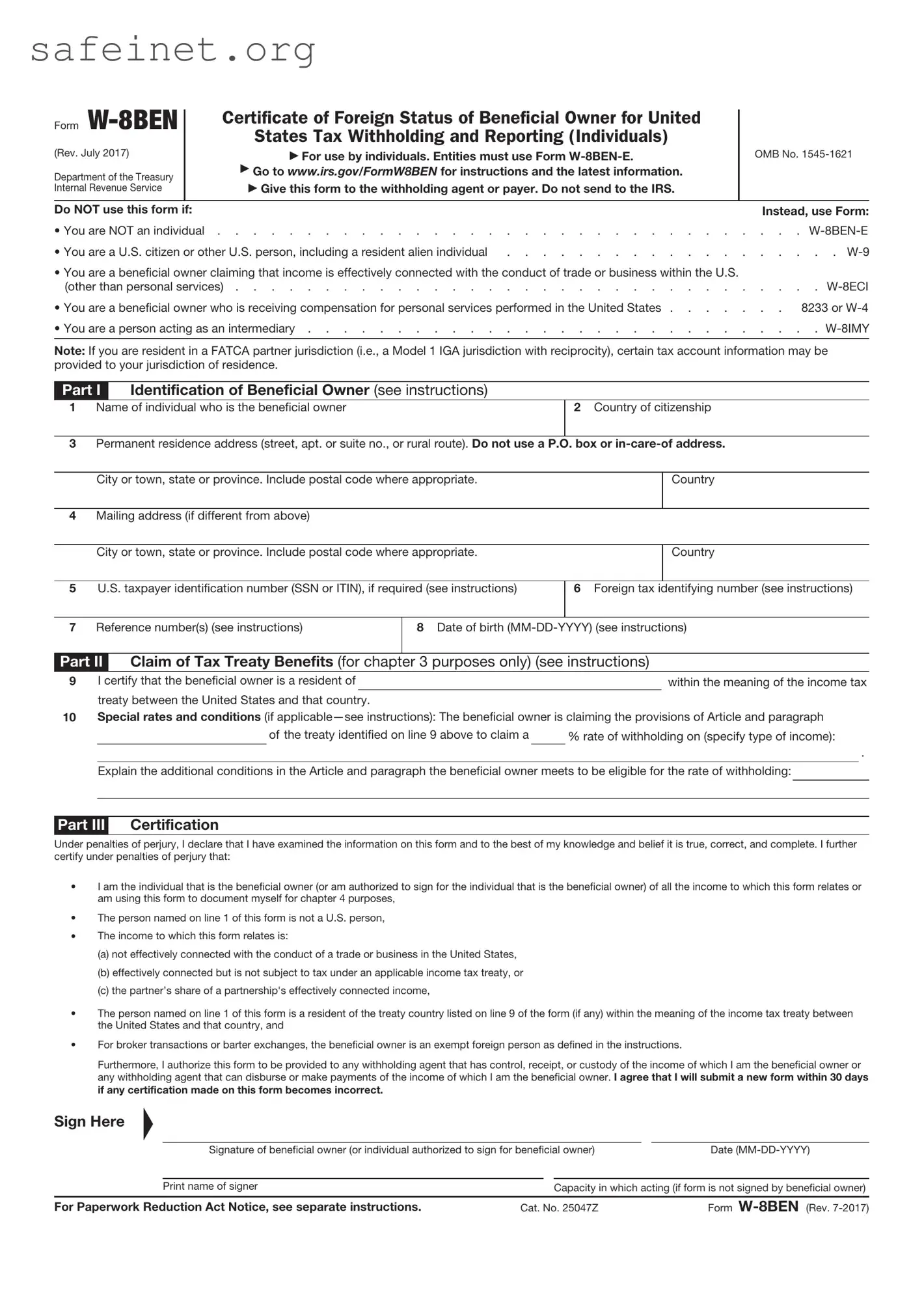The IRS W-8BEN form is similar to the W-8ECI form, which is also used by foreign individuals and entities. Like the W-8BEN, the W-8ECI helps to certify that the income being received is effectively connected with a trade or business in the United States. However, the primary distinction lies in the purpose; the W-8ECI focuses on documenting income that is indeed connected to a business operation within the U.S., as opposed to merely claiming foreign status. Thus, while they share a common theme, their applications serve different contexts in U.S. tax dealings.
Another related document is the W-8EXP form. This form is specifically tailored for foreign governments, international organizations, and foreign central banks. It is used to claim benefits under U.S. tax treaties or exemptions from withholding in certain situations. The essence of the W-8EXP form is its focus on certain foreign entities, while the W-8BEN is meant primarily for individual foreign beneficiaries. Both forms facilitate the appropriate treatment of income received from U.S. sources, but they target different types of foreign entities.
Next, we have the W-8IMY form, which serves a distinct purpose as it is used by intermediaries or flow-through entities. The W-8IMY is meant for entities that can collect income on behalf of others, such as partnerships or trusts. In this manner, while the W-8BEN concentrates on individuals claiming foreign status, the W-8IMY allows for entities that manage distributions to take part in the withholding process and relay the tax benefits to the ultimate beneficiaries.
The 1099 forms, such as the 1099-MISC and 1099-NEC, can also serve as a point of comparison. These forms are used to report income earned by independent contractors and other non-employees. Unlike the W-8BEN, which is aimed at certifying foreign status and claiming treaty benefits to alleviate withholding, the 1099 series focuses on reporting earnings to the Internal Revenue Service for tax compliance. Essentially, while one documents foreign status, the other provides transparency on income distribution.
Another document that is useful to consider is Form 8233, designed specifically for individuals who perform independent personal services in the U.S. This form allows foreign individuals to claim an exemption from withholding on compensation for independent personal services, based on tax treaty benefits. Both it and the W-8BEN share the goal of ensuring the right tax treatment for foreign individuals, yet Form 8233 specifically addresses the context of personal service income rather than general income.
The IRS Form 8821, known as "Tax Information Authorization," can also be compared. This form allows individuals to designate a third party to receive their confidential tax information. While the W-8BEN establishes foreign status for tax purposes, the 8821 focuses more on granting permission for communication between the taxpayer and the IRS. In this way, both forms are relevant to non-residents but serve distinctly different functions regarding representation andIncome documentation.
Moreover, Form 1042-S is closely related to the W-8BEN. This form is used to report income subject to withholding, making it the counterpart to the W-8BEN in the post-income-receipt phase. When individuals or entities complete a W-8BEN to claim a reduced withholding rate, the payor must subsequently issue a Form 1042-S to summarize income payments and any withholding that actually took place. Thus, while the W-8BEN initiates the process, the 1042-S concludes it by reporting the details to the IRS.
Lastly, the IRS Form 8843 serves as another important document. It is used by certain individuals (usually foreign students or teachers) to claim a tax exemption to avoid being considered a U.S. resident alien on the basis of days present in the U.S. The W-8BEN is directed toward income recipients, while Form 8843 is about residency status. Both forms address issues of foreign presence in the U.S. and contribute to determining tax obligations, yet they apply to different circumstances faced by non-resident individuals.

